Published: 24. 2. 2022 Category: Other topics
The collapse in Bosnia and Herzegovina
I have put this article as notes from a conference talk of Matyáš Zrno
in 2015, it is in Czech language: source. I have added
few more related information.
Example of the collapse of society very similar to ours. Standards of living was the same across Eastern Europe (as an average person, you will have access to electricity, heat, water, gas, phones, TV/radio broadcast, the government-supported healthcare system, flats, logistics, etc.).
The collapse was caused by 3 years-long civil war, the exacerbation of nationalist tendencies. The political system was somehow unstable since the fell of the iron curtain from the beginning on '90, but cannot tell yet, that it will lead to the civil war and ethnic cleansing.
The collapse began very fast as government and state stopped to control.
- In the 70s, 80s, a lot of people moved into a government-sponsored block of
flats with central heating, central hot water mains and of course
electricity. For many Eastern European people, it was quite a dream to
move to such living (usually became an employee in a big city will approve
you to move into a government-sponsored flat with very cheap rent [less
than 5% of household income]).
What may look like luxury became the curse very fast:Image source.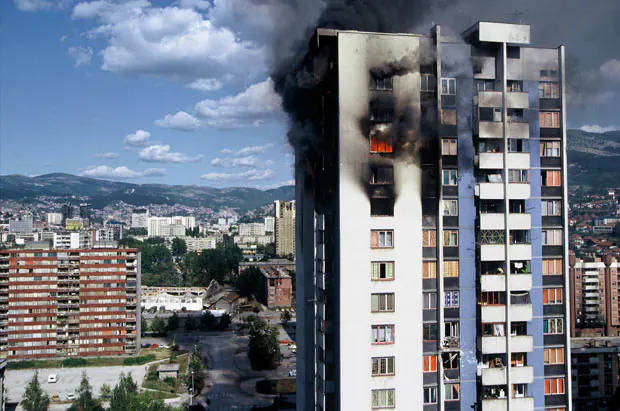
More problems to come: sewerage stops to work, central heating stops work (without alternatives), no water, no gas.
Collecting water to canisters and of course, there is no electricity so the elevator to your flat on the 10th floor is not working.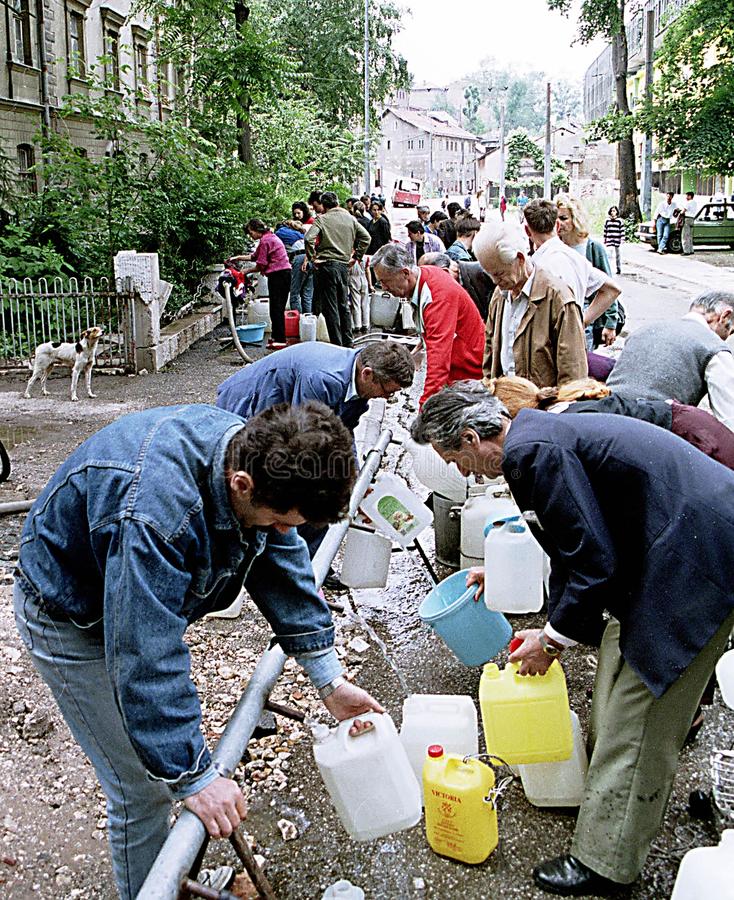 Image source.
Image source.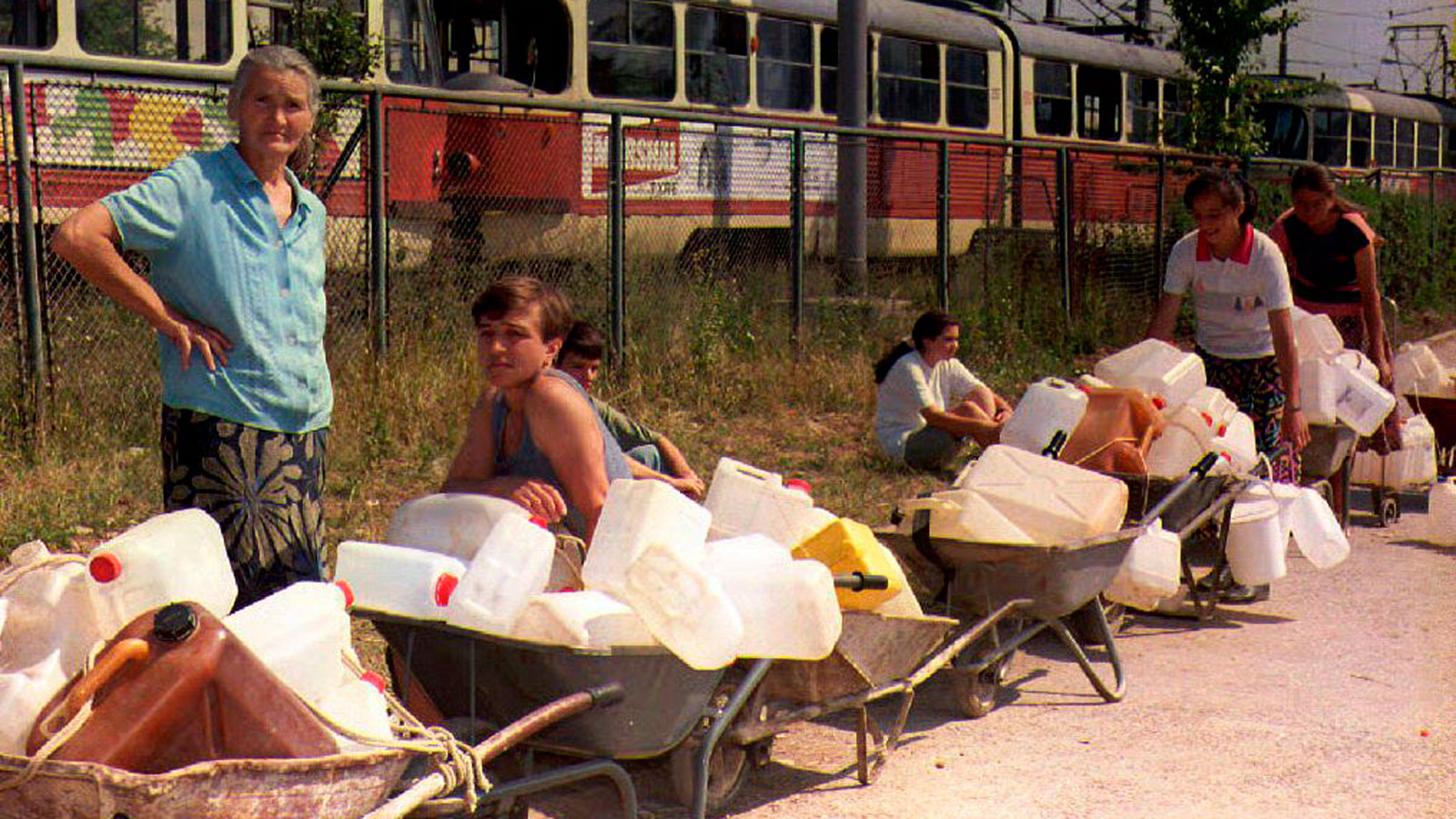
Electric delivery was sometimes working only for short periods during the day. Here is the story about guys developing an emulator of ZX Spectrum 8bit computer called Warajevo. - Another luxury item is becoming obsolete: a car. The cost of gasoline on
the black market may be 50 Deutsche marks a liter (around $25, my estimation is,
that this is around 20% of the monthly wage in Bosnia in 1991) Bosnian money
lost its value at all, so people switched into german marks or US dollars.
However, cars may be still useful, like this trench protection against snipers:
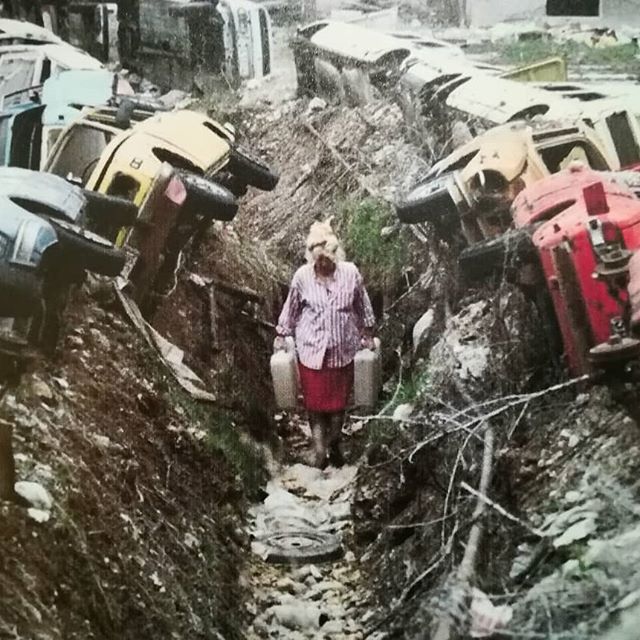
- The groups which adapted fastest to the new situation were criminal
gangs. They have started to lumber trees around the city parks early after the
beginning of spring. The price of fuel wood in the city became astronomical
later.
If you are lucky, you can still find some branches around: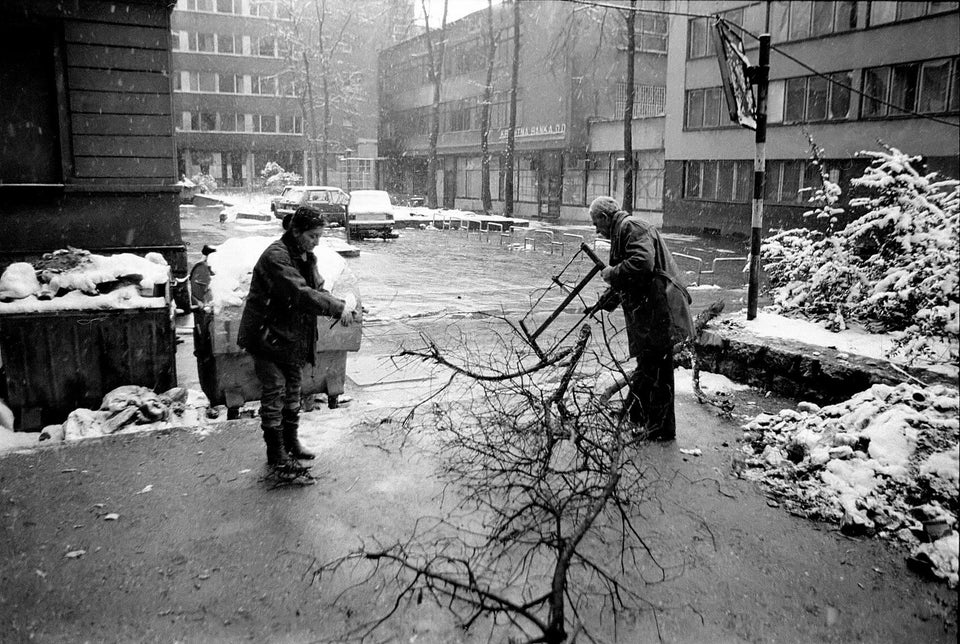
- Another astronomically priced item, built by handy people with small
workshops: improvised fire stoves. The price of such a can-made stove was about
500 marks ($250, approx. two months salary). Having this stove improved your
living standard drastically during the collapse.
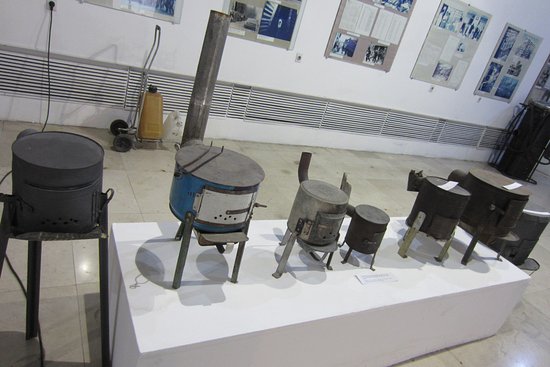
Source. - Another widely accepted currency: cigarettes and alcohol. Small stuff for
barter: lighters, matches, medication, ammunition, batteries, food cans. Always
barter on “public places” and only in small amounts. Never reveal the amount and
place of your stockpiles.
Another example of craftmanship is this water generator in Gorazde:
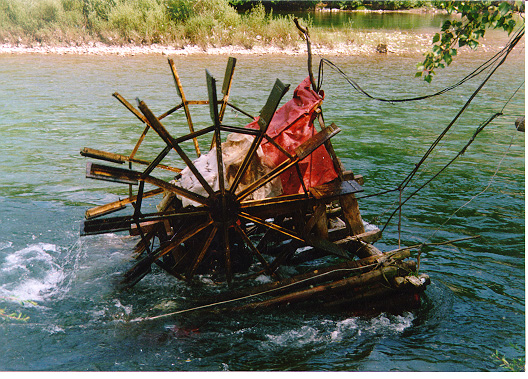
- The average person during the siege of Sarajevo lost about 10 to 15 kilograms (22--33 lbs). In a while, it was quite visible at the first sight who has better access to food (coming from the black market, privileged access to international humanitarian aid, or own stockpiles). The average official emergency support was 159 grams of food a day (approx 6 ounces). The black market and smuggling over enemy lines worked very well during the war times thanks to pervasive corruption.
- Gardening became widely popular and bits of advice for gardening
were given over radio broadcast. Prof. Sulejman Redžić, a botanist,
created shows on the radio station on how to enrich
one’s diet by picking wild plants, even in cities.
Source. - Law enforcement forces disappeared very quickly after the conflict
began. The majority of police guys went home to protect their own
families. A lot of local leaders and politicians run away very quickly
so normal citizens became on their own. Also, the army went throw a similar
process of disorganization and it took a while to renew its
functionality. Also, the army was prepared for conventional conflict with
enemies coming from abroad and not to fight local people equipped with
hunting rifles and shotguns. A lot of regular soldiers did not
understand conflict so they were defying orders to do not risk their
lives. The front line became organized from volunteers, but many of
these volunteers had a criminal background or were football hooligans or
recruited directly from prisons. Their motivation to join the army was
profiteering, stealing, smuggling, vendetta, raping, etc.
One example of criminal paramilitary leader Arkan (Željko Ražnatović). - Saudin Becirevic story from 5th April 1992. He was 18 years old
high school student living in Gazin Han a Muslim district of Sarajevo,
around 5000 people were living there. Muslim people of this district
were given ultimata from Serbian army to surrender weapons until 2 pm
and accept Serbian self-government or the army will attack them.
Around 12:45 the panic started and people have begun to run away by cars and then on barefoot. The rest of his family left too and he received hunting guns and ammunition from his brother-in-law.
Around 2.30 pm, around 45 people with firearms grouped to protect the district (only this small group of 5000 citizens was motivated to stay and protect their homes). One guy from this group was a special force soldier and was equipped with a sniper gun. This guy gave some quick orders to them to stay in particular abandoned houses with strategically positioned windows and wait for the order to shoot.
Serbian army started to approach around 3 pm in several groups and was covered by machine gun positioned on the strategical place with cover of the whole district.
Two groups of 120 soldiers walked on the street and awaited no armed resistance. The guy with a sniper gun shut the leader in front of the formation which felt death on the ground. It caused panic and other soldiers started to run away and resistance started to shoot at them and scream in euphoria. Even the machine gun nest quickly left the position in panic.
This small and lucky victory gave them more time to organize resistance and build some defense system before the next Serbian attack a month later. - People who were trying to prepare for their resistance were buying AK-47
guns on the black market for around 1000 marks ($500). They were trying to
organize in some paramilitary groups. However, other members of the community
seemed those people crazy warmongers. Some of these people were kicked out from
their communities by elders, who were scared that the presence of a paramilitary
group will summons an attack of army forces. Later those groups organized to the
bigger formation and became the resistance, especially at the moment when the
official army was not present.
As you can see, it is very important to have a society equipped with firearms (even if some governments are against possession of legal firearms, the reality is: the government most probably will not be here to protect your ass). - People, in general, do not want to hear about upcoming dangers. The majority of people denied that "something will happen" until the last moment. Even with the fights going on in the neighborhood village or city district, there will be still people denying any danger or thinking that this danger is related only to those dumb rednecks somewhere else and nothing will happen here.